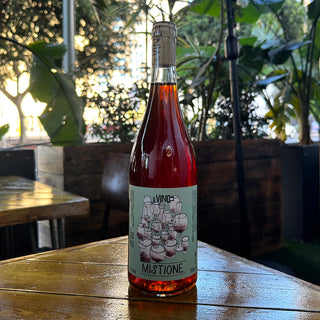Region: Lazio, Italy
Grapes: Procanico, Roscetto, Malvasia, and Canaiolo
Body: Light
Notes: Raspberry, strawberry, cherry, tart
Pairing: Shellfish, Poultry, Lean fish, Cheese
About the wine: The Mistione of the Il Vinco winery is a rosé wine produced from a blend of white and red grapes Procanico, Rossetto, Malvasia Bianca lunga, Canaiolo Nero grown near Lake Bolsena, hence the name Mistione or mischione. The grapes undergo maceration for 2 days on the skins in fiberglass and subsequently the wine is aged for 6 months in steel, without added sulphites.
About the winemaker: Located in Montefiascone in the Viterbo province of Lazio, on the southern slopes of the volcanic Lago di Bolsena, Il Vinco is a joint effort between three friends. Daniele Manoni, Marco Fucini, and Nicola Brenciaglia started the project in 2014 to recuperate and restore the native Canaiolo Nero vines indigenous to the area. Canaiolo is most famously known as a blending grape in Chianti. Here in Lazio, planted on volcanic soils and bottled as a mono-varietal, the variety is allowed to shine.
With the assistance of another native of Lazio, Andrea Occhipinti, who allowed them use of his cellar, the friends began by purchasing 2.5 hectare of old vine Canaiolo, with another 2.5 just planted. The vines are planted in the area between Capodimonte and Marta on the southern shore of the Lago di Bolsena; Le Coste, another noteworthy producer, is located in Gradoli, on the northern side of the lake. The old vines are planted on hilly slopes between 250 and 450 meters above sea level. The climate here is ideal, with gentle breezes from the lake and good exposure. This, combined with their commitment to an organic approach in the vineyards, make for beautiful and interesting wines. Il Vinco is named for the pliable willow branch used to tie the vines to stakes in the vineyard.
Region: Lazio, Italy
Grapes: Procanico, Roscetto, Malvasia, and Canaiolo
Body: Light
Notes: Raspberry, strawberry, cherry, tart
Pairing: Shellfish, Poultry, Lean fish, Cheese
About the wine: The Mistione of the Il Vinco winery is a rosé wine produced from a blend of white and red grapes Procanico, Rossetto, Malvasia Bianca lunga, Canaiolo Nero grown near Lake Bolsena, hence the name Mistione or mischione. The grapes undergo maceration for 2 days on the skins in fiberglass and subsequently the wine is aged for 6 months in steel, without added sulphites.
About the winemaker: Located in Montefiascone in the Viterbo province of Lazio, on the southern slopes of the volcanic Lago di Bolsena, Il Vinco is a joint effort between three friends. Daniele Manoni, Marco Fucini, and Nicola Brenciaglia started the project in 2014 to recuperate and restore the native Canaiolo Nero vines indigenous to the area. Canaiolo is most famously known as a blending grape in Chianti. Here in Lazio, planted on volcanic soils and bottled as a mono-varietal, the variety is allowed to shine.
With the assistance of another native of Lazio, Andrea Occhipinti, who allowed them use of his cellar, the friends began by purchasing 2.5 hectare of old vine Canaiolo, with another 2.5 just planted. The vines are planted in the area between Capodimonte and Marta on the southern shore of the Lago di Bolsena; Le Coste, another noteworthy producer, is located in Gradoli, on the northern side of the lake. The old vines are planted on hilly slopes between 250 and 450 meters above sea level. The climate here is ideal, with gentle breezes from the lake and good exposure. This, combined with their commitment to an organic approach in the vineyards, make for beautiful and interesting wines. Il Vinco is named for the pliable willow branch used to tie the vines to stakes in the vineyard.
What is natural wine?
Natural wine is wine made with minimal intervention from the winemaker, using organically or biodynamically grown grapes and without the addition of chemicals or additives such as sulfites. The result is a wine that is unique, expressive, and often has a more complex and nuanced flavor profile than conventional wines. Natural wine is also often associated with sustainable and ethical farming practices, making it a popular choice for those interested in environmentally friendly and socially responsible products.


